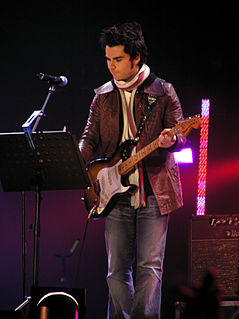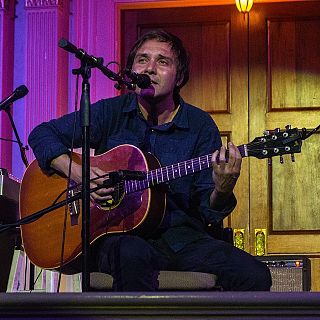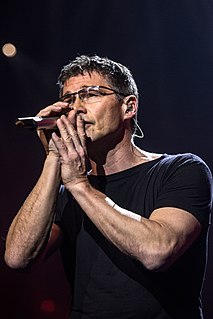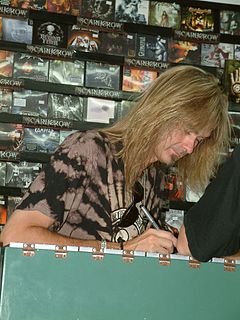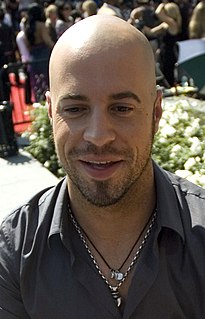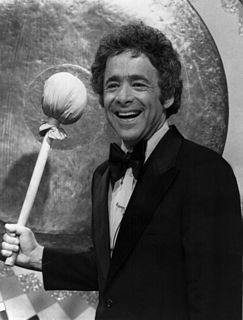A Quote by Kelly Jones
Our band Stereophonics never wanted to release a couple records and be the biggest band in the world for 10 minutes. We always wanted to stand the test of time, and make great music that people would want to listen to and that music lasts. We'd looked up to artists and bands that had big back catalogues.
Related Quotes
There's a good sarcasm and a camaraderie that comes after being in a band. And we've known each other forever. We've never been a band that fought or argued. As a songwriter, I'm really happy that the boys support me and contribute and that, but I've always wanted to be under the band Stereophonics.
I enjoy making music alone, and I like keeping my options open for how I release my own songs. But everybody in Grizzly Bear is full of ideas. So it's kind of boring to come to the band with a complete song and be like: "Here's what I want you to do." With this record, we wanted to make everything feel like everyone - music that we could never do on our own. That's a real gift, and it's one of the best things about being in a band like this.
I had always wanted to make music on a big scale but never knew how it was going happen - until I saw a band in Oslo called Bridges. I was stunned. They had everything. The only thing they didn't have was me. I knew I needed to join, not for my own sake but for the band's. I knew I was a necessary ingredient.
I never wanted to be that fad type of artist. When I looked up to artists, watching TV, I wanted to see somebody. I wanted to touch that person. I wanted to sound like them. I wanted to move like them. That' s what I want my fans to do. So that's why, everything that I do, the music I make, how I dress, it's all based off my lifestyle.
In the early eighties, there were a lot of artists involved with the music scene. All those young artists, before their careers took off, were into music. Robert Longo used to play some guitar. He had a band for a while. Basquiat had a band. I mean, people were always trying to mix music and art - in fact, I'm guilty of it myself.
A weird thing about Gossip that I've always said: 'If I weren't in this band, I would never listen to it.' But I would go see it. It's a band you would go see that you don't necessarily listen to. We've always wanted to do a live album because personally, I think we're a way better band live than on record.
I really wanted to, but I just didn't understand how people became comedians. I kind of thought it was something you were born into. And so I wanted to be a veterinarian or an architect. I wanted to be in a band, and for some reason I could understand how you could be in a band because I had guitars and all my friends played music. Comedy was a secret want, but it wasn't anything I pursued.
Early on, before rock 'n' roll, I listened to big band music - anything that came over the radio - and music played by bands in hotels that our parents could dance to. We had a big radio that looked like a jukebox, with a record player on the top. The radio/record player played 78rpm records. When we moved to that house, there was a record on there, with a red label. It was Bill Monroe, or maybe it was the Stanley Brothers. I'd never heard anything like that before. Ever. And it moved me away from all the conventional music that I was hearing.
I do not want and will not take a royalty on any record I record. I think paying a royalty to a producer or engineer is ethically indefensible. The band write the songs. The band play the music. It's the band's fans who buy the records. The band is responsible for whether it's a great record or a horrible record. Royalties belong to the band. I would like to be paid like a plumber. I do the job and you pay me what it's worth.
But I always wanted to do a theatrical stuff. But when you're in a metal band of course you're limited because five people in the band, um, you've got no keyboards... you're limited. And I wanted... to go over-the-top, you know. Literally. I wanted to make an album that people would either hate or love.
[Music From the Edge of Heaven] wasn't really an album at all. The band had made the decision to release an LP and then split up. We wanted to go out with a bang in Britain and the rest of the world by having a single that was four songs, not just one song. But we couldn't do that over here because we couldn't release a single without an album.
I went out and started on my way up in television. I wrote music, I wrote books, I played an instrument half-ass. I would always have liked to play in a band. I would always have liked to be a substantial writer, to write country music for big singers. I had all sorts of proclivities, but I never had any big success.
